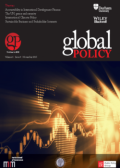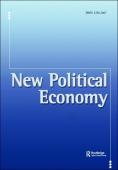
As countries negotiated a new climate agreement for the United Nations climate conference in December 2015, a groundswell of climate actions emerged as cities, regions, businesses and civil society groups act on mitigation and adaptation, independently, with each other and with national governments and international organizations. The Paris conference provided a historic opportunity to establish a framework to catalyse, support, and steer these initiatives. Without such a framework, ‘bottom-up’ climate governance runs the risk of failing to deliver meaningful results. Social science research highlights the need for a comprehensive approach that promotes ambition, experimentation and accountability, and avoids unnecessary overlaps. This article specifies functions and design principles for a new, comprehensive framework for sub- and nonstate climate actions that could provide effective coordination.
Public-private partnerships (PPPs) are a relatively recent phenomenon in the irrigation sector; the El Guerdane project in Morocco is the first of its kind worldwide. Implemented in 2008, it now provides water to 10,000 ha of highly lucrative citrus fruit plantations. International development banks present this project as a success story, but results in terms of local development have been at best mixed. While some farmers have benefited from the initiative, others have experienced increased marginalization from water, fertile land, and development. Based on extensive field research in the El Guerdane area between 2005 and 2013, the present paper identifies three key critical issues posed by this PPP: partly negative effects on livelihoods and socioeconomic development; an unequal sharing of costs, benefits and risks between public and private partners; and uncertain environmental impact. Based on this analysis, the authors reflect on the significance of the project for the evolution of economic and political power relations in Morocco. This paper is only available in French.

At the heart of green industrial policy is rent management: government creating and withdrawing opportunities for profitable investment. This paper asks what the key factors are for rent management to succeed. Drawing on a range of literatures, the paper first deals with the critical success factors for ‘normal’ rent management and then turns to one of the most pressing and controversial issues of our time: how to bring about the transition to green energy. This is extra challenging because technological uncertainties are high, time horizons for investment are long, yet action is required now.
Globally, new forms of electromobility are challenging established transport technologies based on internal combustion engines. The authors explore how this transition is simultaneously unfolding in four countries, enabling them to shed some light on the dynamics and determinants of technological path creation. The paper's analysis covers two old industrialized countries (France and Germany) and two newly industrialized countries (China and India) with very different market conditions and policy frameworks. It reveals enormously different choices of technologies and business models and traces them back to four main drivers of divergence: technological capabilities, demand conditions, political priorities and economic governance.
This paper asks what insights the literature provides on divergence versus convergence of innovation paths in Europe and Asia. It contrasts the abundant literature on determinants of innovation paths with the scarcity of studies that are explicitly comparative across countries or continents. Implicit conclusions however emerge from several lines of work including evolutionary perspectives which stress differences in national conditions, and other perspectives which stress latecomer and globalisation effects. This paper distils and draws together the main conclusions on why innovation paths can be expected to diverge or converge. Its contribution lies in spelling out and bringing together implicit and explicit insights from a wide range of literatures. It also provides an analytical backdrop for some of the other papers in this special issue of Science and Public Policy which provide comparative empirical analyses of low carbon innovation paths.
